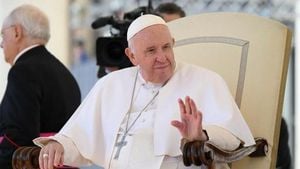Marcin Romanowski, a member of the Law and Justice party (PiS), has been living in Hungary since December 2024, where he received asylum. In a recent interview with Telewizja wPolsce24, Romanowski discussed the political situation in Poland, particularly focusing on the upcoming presidential elections set for May 18, 2025. His comments, while ostensibly expressing concern for democratic processes, raise significant doubts and may be interpreted as an attempt to manipulate public opinion and evade accountability for his actions.
Romanowski claims to be preparing a report detailing threats to democratic processes in Poland related to the presidential elections. He indicated that the report is expected to be released next week, the week of April 28, 2025, and will specifically address the elections. He ominously suggested that a victory for Rafał Trzaskowski, the candidate from the Civic Coalition, would lead to a "catastrophe." However, such statements lack concrete evidence and resemble typical political rhetoric aimed at scaring voters.
His assertion about the impending "catastrophe" lacks clarity, rendering his statement more emotional than substantive. Historically, PiS has employed similar narratives to mobilize its electorate; for instance, in 2023, party leader Jarosław Kaczyński accused Donald Tusk of acting on behalf of Germany and Russia, allegations that also lacked factual support.
Moreover, Romanowski portrays himself as a victim of political repression, claiming he cannot return to Poland due to a lack of access to a fair justice system and numerous acts of lawlessness. He mentioned the absurdity of the charges against him and the repression faced by others, such as Dariusz Matecki. However, these claims contradict the facts; Romanowski is wanted by the Polish prosecutor's office based on a search warrant linked to 11 charges, including participation in an organized crime group and abuse of power during his tenure as Deputy Minister of Justice.
His flight to Hungary and subsequent asylum can be interpreted as an effort to evade responsibility rather than a quest for justice. In this context, his calls for "open discussions about lawlessness" come off as a cynical attempt to craft a martyr's image.
While in Hungary, Romanowski appears to be leveraging his situation to influence Polish politics from abroad, raising further questions about his intentions. Hungary, under the leadership of Viktor Orbán, has faced criticism for its departure from democratic principles, which casts doubt on Romanowski's credibility as a defender of democratic processes.
If his report is indeed published, it may serve as another tool to destabilize the political situation in Poland rather than a genuine analysis of the issues at hand. It is noteworthy that PiS, the party to which Romanowski belongs, has previously been accused of manipulating media and state institutions to maintain power, undermining his moral authority to criticize the current government for alleged "lawlessness."
Romanowski's statements fit into a broader pattern of PiS actions that, after losing power in 2023, seek to undermine the legitimacy of Donald Tusk's new government. Accusations of election fraud or violations of the rule of law, which Romanowski implicitly raises, have previously been employed by PiS and the Confederation in the context of alleged electoral manipulations. Such actions aim to sow distrust in democratic institutions and could contribute to further polarization within society rather than fostering constructive debate.
Romanowski's remarks appear to be more of a political maneuver than a genuine concern for democracy. His asylum in Hungary, the absence of concrete evidence supporting his claims, and PiS's history of undermining democratic standards suggest that his report may be another weapon in the political struggle rather than a reliable document.
Poles should approach such declarations with a healthy dose of skepticism, especially in the heated pre-election period. The implications of Romanowski's statements and actions could have significant ramifications for the political landscape in Poland as the country gears up for the pivotal elections.
In summary, as the presidential elections draw nearer, the political rhetoric surrounding them intensifies. Romanowski's position, marked by his asylum in Hungary and the serious charges against him, highlights the complexities of Polish politics, where accusations and counter-accusations are part of the electoral strategy. With a report on threats to democracy looming, the public will need to critically evaluate the motivations behind such claims and the potential consequences for Poland's democratic future.






